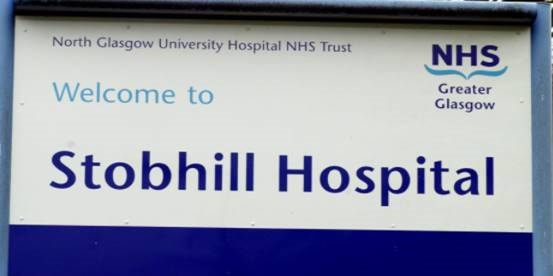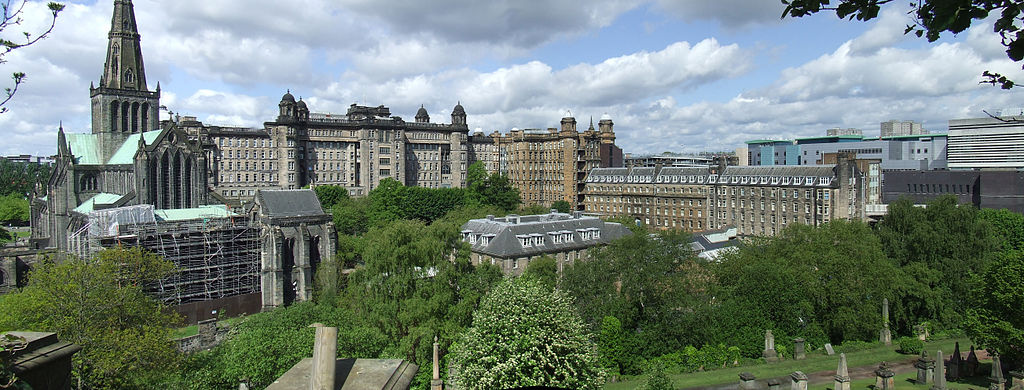Find out about The Open University's Social Sciences courses
This article belongs to the Women and Workplace Struggles: Scotland 1900-2022 collection.

Background
In early 2000 Medical Secretaries in North East Glasgow (NEG) NHS Trust, which included Stobhill Hospital, Glasgow Royal Infirmary, Glasgow Western Infirmary and Gartnavel General Hospital, became aware that they were being paid up to £2000 per year less than Management Secretaries. Management Secretaries were on grade 4 of the Admin and Clerical Whitley Pay Scale whereas Medical Secretaries were paid at grade 3. This disparity was unjustifiable as the only obvious difference was who they worked with on a daily basis, i.e. who they were managed by.
Medical Secretaries worked for senior doctors and consultants, transcribing doctor’s notes and discharge letters which contained information relating to diagnosis, prognosis and medications. This work required a high degree of accuracy and was underpinned by a specific qualification. In contrast, Management Secretaries worked for non-clinical hospital managers, did not require the same qualification and undertook normal secretarial duties, organising meeting, taking minutes and typing letters.

Medical Secretaries Campaign June 2000- August 2001
In early 2000 Medical Secretaries raised the disparity informally with local management. Several months later in June 2000, having made no progress they submitted 165 individual formal grievances. A protracted grievance process followed which other than raising awareness of similar issues in UNISON Branches across Scotland failed to achieve anything. The local issue became a national issue and was escalated by UNISON to Government level.
By April 2001, still with no progress, staff in NEG Trust gave management notice of their intention to ballot for industrial action. In May that year, over 200 medical secretaries protested within the grounds of Stobhill Hospital. This highlighted their dispute both locally and nationally, and successfully built support from other NHS staff and the wider public.
Internationally renowned Professor Imrie, who was based at Glasgow Royal Infirmary at the time, said:
''The feeling across the trust is running very high…I have not spoken to a single consultant who would not be behind the medical secretaries.'' (The Herald, April 14, 2001)
The subsequent ballot result overwhelmingly supported industrial action and by August 8, 2001, Medical Secretaries in NEG Trust began 3 days strike action demanding:
- Unconditional upgrading to band 4 of Whitley Scale
- Backdating of payments to June 2020
- Retention of proficiency allowance
UNISON’s Response Scotland-Wide
Running parallel to these developments in Glasgow, UNISON had been working for over a year to secure a national settlement to the pay disparities between secretaries across Scotland. It was not until after the Glasgow vote in favour of industrial action they had an offer to put to their members. The offer, contained in a National Framework for Medical Secretaries, would see up to 21.32% pay increases over four years. Based on this, UNISON held a national ballot of medical secretaries in August 2001.
An overall majority of members across Scotland voted to accept the offer, but there were several NHS Trusts where the majority rejected it. Lothian Acute Branch, Lanarkshire Acute, Argyle and Clyde and North Glasgow Trust all voted against the offer and for strike action. On August 24, 2001, UNISON agreed to back those union branches who had rejected the offer and had voted for strike action.
On September 1, 2001, 300 Medical Secretaries across North Glasgow Hospitals embarked on 3 days of strike action. This was marked with a highly successful demonstration and rally in Glasgow. UNISON members from across Scotland, politicians and other trade unions came to show their support. More importantly they received donations and messages of solidarity from the trade union movement across Scotland and elsewhere in the UK.
Over the next six weeks the strike escalated incrementally until October 22, when it moved to all-out strike action. At this time Lothian Acute Branch announced they would be joining the action. After three days of all -out action, management made an improved offer and the strike was suspended. Within days management reneged on the new offer and strike action recommenced and UNISON requested support from ACAS.
Discussions with ACAS resulted in a National solution that saw workers gaining:
- Unconditional upgrading to band 4 of Whitley Scale
- Backdating of payments to Oct 2020
- Retention of proficiency allowance
This was a huge victory for the women in NEG Trust, most of whom had never before been active in their trade union.Their sense of injustice over pay was fuelled when management ignored them, but this might have dissipated without the full support of local branch officials. The branch leadership worked alongside them developing their skills in trade union organising, in building campaigns and solidarity across the trade union movement. These skills and their experiences changed these women and the outcome of the dispute.

Rate and Review
Rate this article
Review this article
Log into OpenLearn to leave reviews and join in the conversation.
Article reviews
In the bullet points of demands in the campaign section of the text it say
"Backdating of payments to June 2020" this seems like an error a date in the 2000's makes more sense.